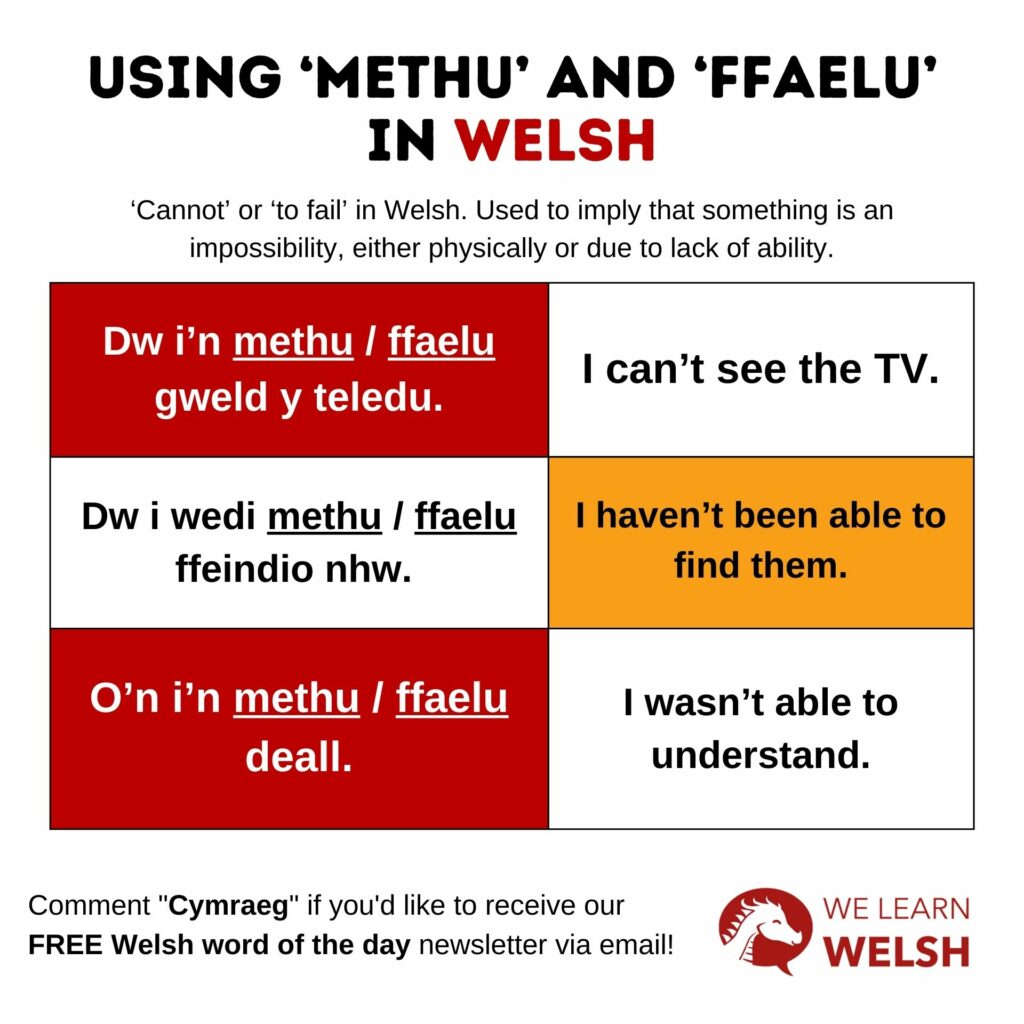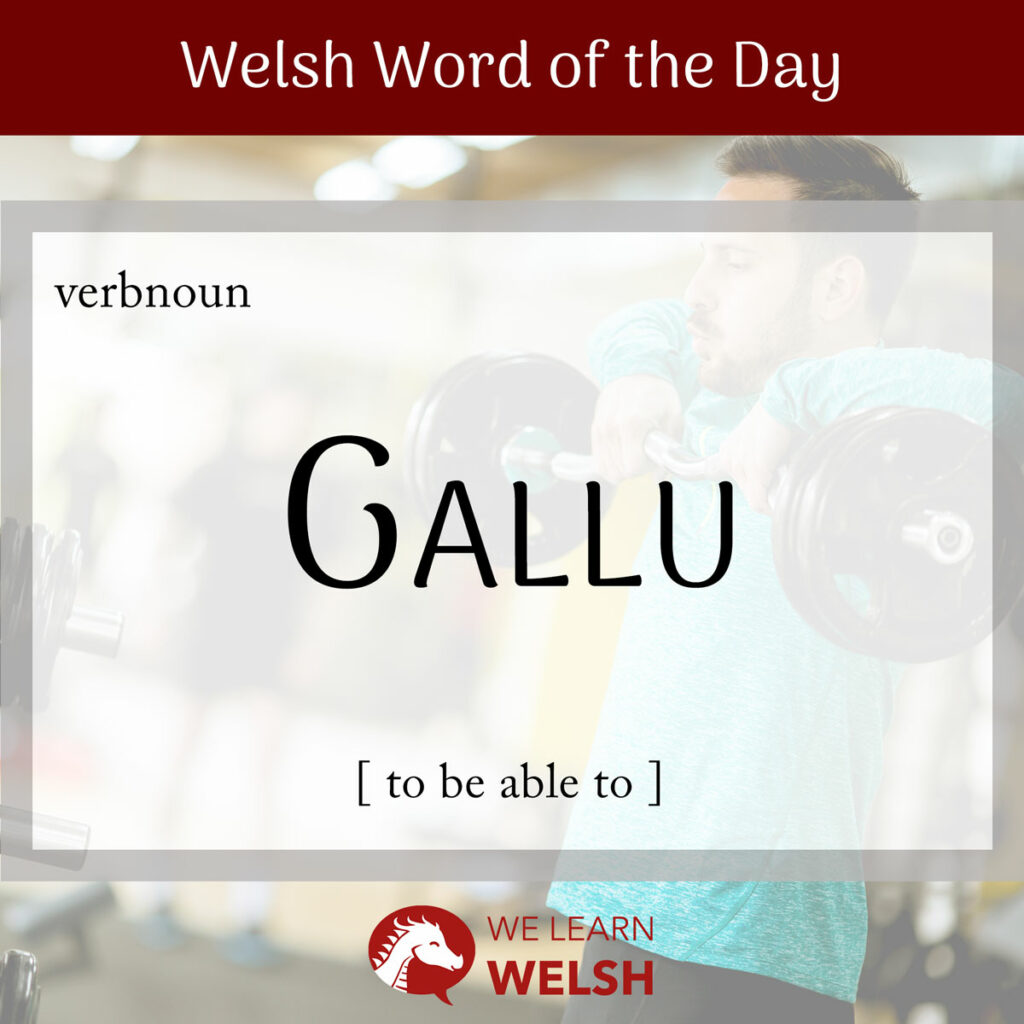Dych chi’n gallu siarad Cymraeg? (Can you speak Welsh?) It’s kind of a moot point here at We Learn Welsh, since what we think is really important is that dych chi’n gallu dysgu Cymraeg (you can learn Welsh). And this is definitely the case, because anyone can learn Welsh!
The verb gallu in the previous two phrases means to be able to. It’s like can in English. And similarly to can, it’s often used in the sense of to be permitted to. Let’s find out some more about it!
gallu
to be able to
This word comes from the proto-Celtic *galnati, which itself can be traced all the way back to the proto-Indo-European *gelh. So there are actually cognates both in languages similar to Welsh, like gallout in Breton, and those from much further afield, like galeti in Lithuanian. Both of these mean the exact same thing as gallu.
Another important thing to know is that this word is more specifically from the Southern Welsh dialect. Though it can be heard and understood all over Wales, the synonym medru is the more common choice overalll in the North. In Mid and West Wales, you might hear both options.
The vast majority of what I’ll say about the grammar of gallu in this article also applies to medru. One key exception, though, is that medru can’t mean to be permitted to, as gallu can.
Do‘n i’m yn gallu credu fy nghlustiau pan glywais y newyddion!
I couldn’t believe my ears when I heard the news!
So, if you wanted to ask alla i fynd? (may I go?) you would have to stick with gallu, not medru, in the North or South. Or, you could go a different route and use a conjugation of cael (to get / to be able to) – in this example it would be ga i fynd?
As well as synonyms, gallu has important antonyms, which are methu (to fail / to be unable to) and the more casual ffaelu, which means the same thing.

This is how gallu mutates:
Soft mutation
allu
Nasal mutation
ngallu
Aspirate mutation
N/A
The nasal mutation of gallu is only used when it’s functioning as a noun – more on that later. But the soft mutation comes up all the time, particularly in conjugated forms of it. And like all verbs, one of the most important things to know about gallu is its conjugations.
| Future / present | Conditional | Past | |
| First person singular | Galla(f) i I will be able to / I can | Gallwn i / gallaswn i I could | Roeddwn i’n gallu I was able to |
| First person plural | Gallwn i We will be able to / We can | Gallen ni / gallasen ni We could | Roedden ni’n gallu We were able to |
| Second person singular / informal | Galli di You will be able to / You can | Gallet ti / gallaset ti You could | Roeddet ti’n gallu You were able to |
| Second person plural / formal | Gallwch chi You will be able to / You can | Gallech chi / gallasech chi You could | Roeddech chi‘n gallu You were able to |
| Third person singular | Gall o/e/hi He/she will be able to / He/she can | Gallai fo/fe/hi / gallasai fo/fe/hi He/she could | Roedd o/e/hi’n gallu He/she was able to |
| Third person plural | Gallan nhw They will be able to / They can | Gallen nhw / gallasen nhw They could | Roedden nhw’n gallu They were able to |
For example, people often switch the alli di form to elli di. Another variation is that sometimes when people are speaking casually they’ll drop the first syllable ga for the longer conditional forms – so example this could result in ‘llasen ni (we’d be able to).
What you might notice in this table is that for the past forms of gallu, I haven’t used traditional conjugations, but have instead combined gallu with past tense forms of bod (to be) in order to show that it’s past tense. This isn’t because there are no past tense forms of gallu itself, but because they’re not in common use. The forms I’ve provided are much more standard.
The reason the soft mutation is used a lot here is because conjugated forms of gallu generally appear at the start of a sentence. This could be in three forms:
- Negative, such as alla i ddim (I can’t) or allet ti ddim (you couldn’t). Here, the soft mutation should always be used. That’s why the g at the start of the word has disappeared.
- Interrogative, such as alla i? (can I?) or allet ti? (could you?) Here too you should always use the soft mutation.
- Positive, such as (g)alla i (I can) or (g)allet ti (you could). Here there will be a lot of variation as to whether people use the soft mutation or not.
The reason the positive forms of the phrase are inconsistent in terms of soft mutation is that the mutation is triggered by a word that is no longer present!
This word is the particle mi or fe. It comes at the start of the sentence, e.g. mi alla i (I can). It’s usually dropped except in very formal language, but many people retain the mutation it would have caused.
Alla i ddim credu ei bod hi’n gallu canu’r piano.
I can’t believe she can play the piano.
The question form is important too, especially because it’s often used to ask for permission. My early example was Alla i fynd? (May I go?)
As with all questions in Welsh, the default answer is to repeat the verb in question, either affirming or negating the question. It also needs to be conjugated appropriately. It’s basically like replying either you can or you can’t rather than having a set word for yes or no.
In this case, you could respond to alla i fynd with either (g)alli (you can) or na alli (you can’t). When speaking formally or to a group, instead say (g)allwch (you can) or na allwch (you can’t).
The same pattern applies for other tenses and conjugations. Could they come? is allen nhw ddod? The reply would be either allen (they could) or na allen (they couldn’t).
‘Nawn ni helpu fo, os gallwn ni.
We’ll help him, if we can.
And since this is such a useful and basic word, plenty of set phrases use it too.
- cyn gynted ag y gallaf = as soon as I can
- beth allai fod? = what can it be?
- dwi’m yn gallu helpu = I can’t help it
- allwch chi ddim ond trio = you can only try
- sut y gallet ti? = how could you?
- hyd y galla(f) i = as far as I can / as much as I can
Lastly, gallu can also actually function as a noun, meaning ability, force or power. It’s considered masculine, and the plural is galluoedd or galluon (abilities).
It’s somewhat old-fashioned—for instance, the term gallu canolffo was once used to translate centrifugal force, but today, grym allgyrchol is the standard. However, it still appears in certain contexts, such as o fewn fy ngallu (in my power).
Multi-faceted words like gallu seem daunting – but it’s definitely o fewn dy gallu (in your power) to master them! 😊


